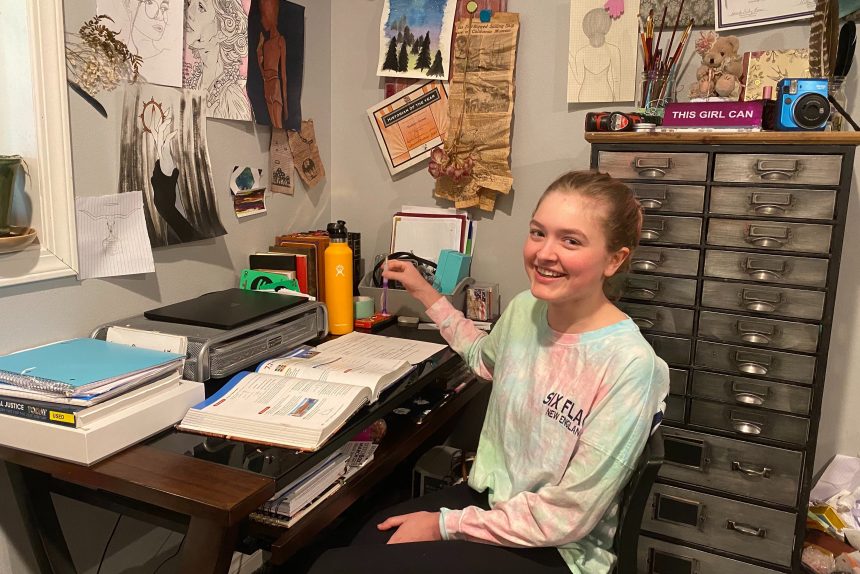Scio family praises new distance learning approach at every level
School resumed Wednesday in Scio for the Nelson family.
With a sophomore, an eighth-grader, a third-grader and a 2-year-old at home, the Nelson family is getting the full experience.
There was science. Math. Agriculture. There was individualized education program instruction. There was homework and teacher contact, all done from a distance with parent help.
“So far it’s been pretty smooth,” Anber Nelson said at midday about her children’s experience.
With Monday’s guidance from the Oregon Department of Education clearing the path for schools to offer classes again, the Scio School District southeast of Salem launched its new distance learning plan Wednesday. Students will be tackling new subject matter and receiving assignments. Issues such as attendance and proficiency standards still depend on further rulings from ODE, but children are working with their teachers again.
Success for many students will depend on parent support.
Anber Nelson is pretty involved. She has been assigning her children essays and lessons during the school closure, but she is happy to have them back before teachers.
“I don’t want them just to maintain,” she said. “I would like them to continue to learn.”
Each child has a work area. She laughingly said a 2-year-old running around playing with blocks and asking for snacks might be distracting but classrooms often have distracting students as well.
Mashayla, a sophomore, said the first day from home was “pretty cool.” For starters, she gets to sleep an hour later.
She received homework in her first class of the day, Spanish.
Her global studies class got together through Google Meet. Mostly the teacher used the time to check out the new technology and to figure out what they could do.
Not everything can be replicated online. Her drama class postponed their play until November. Friends in career and technical education classes can’t have that hands-on learning, and her sports-minded friends are also missing out. Mashayla can still talk to her friends, but it’s different through a screen, she said.
For Mashayla, distance learning works because she is motivated. She is taking college courses already, and she knows she wants to graduate. She suspects, though, that some of her fellow students might not take online school seriously.
“I know a lot of people who will not do the work because they don’t think it’s necessary,” she said.
Ty, an eighth-grader, started the day with a video from his math teacher and an assignment he will take a picture of and return. He had his first Google Meet for science, with most of the class there.
The teacher gave instructions and students could chime in.
“I got everything I needed,” he said.
He had another Google Meet for agriculture, which lasted about 20 minutes. At some point he will need to video himself doing 15 minutes of cardio for physical education.
Ty likes the new approach better than regular school because he can work at his own pace.
Alivia, a third-grader, misses going to school but she said the first day was “a little fun.” She said it is exciting working online because she hasn’t done that before.
Alivia receives extra services for some speech difficulties and reading challenges. Her reading teacher gave her stories to read and a quiz through Google Classroom, although she didn’t talk to her.
Later Alivia spoke with her regular teacher and received lessons in core subjects. On Thursday, she will meet with her speech teacher through Zoom.
Anber retains some concerns about her daughter’s online learning accommodations but said she is satisfied the school has done everything it can. Her teacher and specialists have been meeting and coordinating Alivia’s work.
Alivia has about three hours a day of curriculum, with reading on the computer and paper homework. Her school schedule builds in breaks and play time, and mom is adding lessons as well. But social distancing requirements shut down Alivia’s after-school Spanish class.
Scio’s new system relies heavily on at-home adult support, especially for younger children, and Anber knows her family is in a relatively good situation. They have space and enough devices. Her older children can mostly take care of themselves. Alivia is motivated and happy to be learning. Anber and her husband, Randy, own their company and can both be home to help the kids.
She knows other families face higher hurdles, but she said the school staff and teachers are making themselves available and doing a lot to offset extra burdens on families.
Anber especially likes the certainty of the new school days as opposed to “supplemental learning.”
“I like the routine part of it,” she said. “Something for kids to expect rather than however and whenever.”
– Jake Arnold, OSBA
jarnold@osba.org
(photo courtesy of Anber Nelson)

